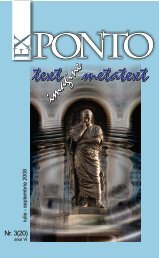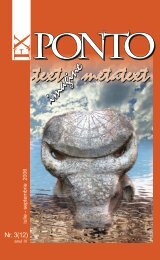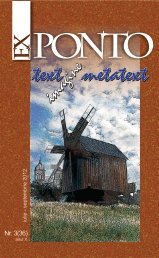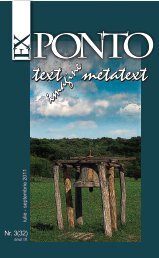Nr. 3 (24) anul VII / iulie-septembrie 2009 - ROMDIDAC
Nr. 3 (24) anul VII / iulie-septembrie 2009 - ROMDIDAC
Nr. 3 (24) anul VII / iulie-septembrie 2009 - ROMDIDAC
You also want an ePaper? Increase the reach of your titles
YUMPU automatically turns print PDFs into web optimized ePapers that Google loves.
EX PONTO NR.3, <strong>2009</strong><br />
162<br />
other, it allowed doctors to treat patients discretionarily, since the objective<br />
reality was a good enough excuse anyway. On the list of credits, there are<br />
big names from the medical profession who fight the system to change it<br />
radically: Sorin Oprescu, the current director of the Municipal Hospital, is the<br />
most important of them. He chose to become a politician simply to get access<br />
to power and money to modernize the hospital and he succeeded. He became<br />
a model for renowned surgeons, neurologists, and obstetricians, all of whom<br />
entered politics to be able to finance their home institutions. Their names are<br />
also among the credits. This detail may support the interpretation of the film<br />
as a critique of the Romanian system which still needs political reinforcement<br />
for any step, no matter how vital it may be.<br />
The documentary aspect with its implicit irony serves Puiu’s critique very<br />
well. He did not look for the topic of his mock documentary too far; he looked<br />
around and found the “savages” nearby, “savages” about whom Grierson<br />
talked to Robert Flaherty. Grierson related his conversation with Flaherty about<br />
“exoticism” as the crucial element of a documentary in his diary:<br />
‘Beware the ends of the earth and the exotic: the drama is on your doorstep<br />
wherever the slums; are, wherever there is malnutrition, wherever there<br />
is exploitation and cruelty. You keep your savages in the far place Bob;<br />
we are going after the savages of Birmingham,’ I think I said to him pretty<br />
early on. And we did.<br />
It seems that Puiu took Grierson’s advice literally and he went after the<br />
“savages” of Bucharest in the least expected place, the hospitals.<br />
In the good Romanian cultural tradition according to which “nobody is<br />
a prophet in his own country,” meaning that someone must be acclaimed<br />
internationally first and then someone may expect the recognition of his<br />
fellow-citizens, Puiu, as well as Mungiu, had to make the headlines in the<br />
European and American media as prize winner. They had to appeal to the<br />
international market, and finally they drew the Romanians’ attention. Thus,<br />
Romanians themselves buy what these directors have sold the Western market<br />
as Romanian identity. In their turn, Romanians, even those who learned about<br />
communism from history books and their parents’ memories, reconsider their<br />
perspective on Romanian identity, comparing the Romanianness presented<br />
in these docudrama like movies with the cultural models taught in schools<br />
and universities. Due to the realistic reconstruction of the communist era and<br />
the authenticity of contemporary Romania in these movies, Romanian public<br />
prefer to identify with the images from the movies and not with historical<br />
and cultural clichés. The fact that the foreign film critics have emphasized<br />
“exoticism” as one of the features of Romanian identity does not seem to<br />
bother the Romanian public at all; on the contrary, they have started to put the<br />
communist past behind them while judging it more critically, on the one hand,<br />
and at the same time to become more critical of the current context.<br />
The communist past and its remains become the main identity features<br />
of Romanianness, even if they present an incomplete portrait of Romanian<br />
identity, that portrait which is already sketched by the others, which meets the<br />
others’ stereotypes about Romania and plays with them. After the “success”<br />
of the life broadcast of Romanian revolution from December 1989 and the first<br />
documentaries about Romania which promoted exclusively the most degrading<br />
aspects of Romanian communism, Romanian filmmakers understood that the<br />
everyday life misery during the communism or as a consequence of that era
















